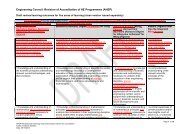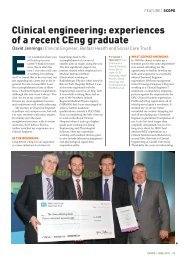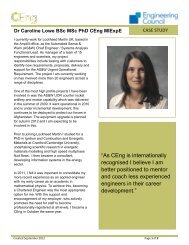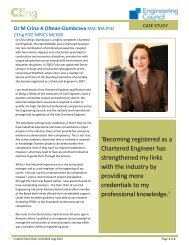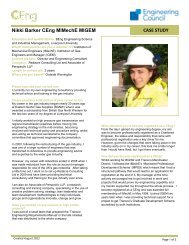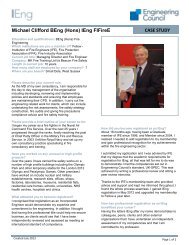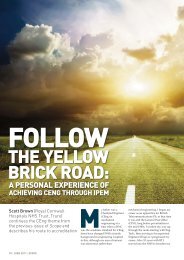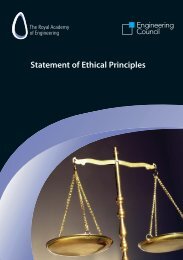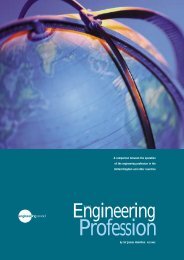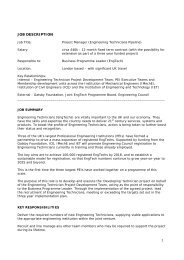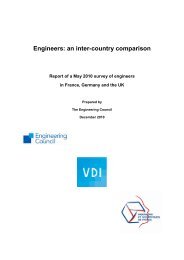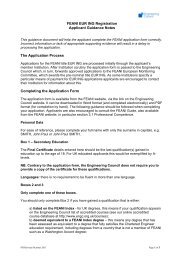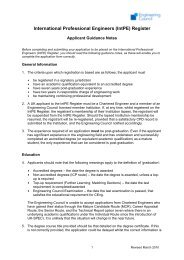An Engine for Change - A Chronicle of the Engineering Council
An Engine for Change - A Chronicle of the Engineering Council
An Engine for Change - A Chronicle of the Engineering Council
You also want an ePaper? Increase the reach of your titles
YUMPU automatically turns print PDFs into web optimized ePapers that Google loves.
1988-1990: THE BARLOW YEARS 61working party was set up to produce Rules <strong>of</strong> Conduct to supplement <strong>the</strong> existing brief Code<strong>of</strong> Conduct. This cost <strong>the</strong> EngC over £45,000 in legal and pr<strong>of</strong>essional fees <strong>for</strong> verifying that<strong>the</strong> Rules were absolutely correct – doubling <strong>the</strong> EngC’s normal annual costs <strong>for</strong> such fees.In October 1989 <strong>the</strong> biennial survey <strong>of</strong> ‘Chartered <strong>Engine</strong>ers, Incorporated <strong>Engine</strong>ers and<strong>Engine</strong>ering Technicians’ was made available at £100 (four times <strong>the</strong> 1985 selling price). Thesurvey, <strong>the</strong> fourth published by <strong>the</strong> EngC, and based on a 15% sample <strong>of</strong> Registrants, againexamined Registrants’ salaries, employment positions, and <strong>for</strong>eign language skills, and <strong>the</strong>irinvolvement in school-industry links. It was clear that Registrants had again received salaryincreases com<strong>for</strong>tably in excess <strong>of</strong> <strong>the</strong> Retail Price Index. The numbers satisfied with <strong>the</strong>irinitial training increased, as did <strong>the</strong> numbers who declared <strong>the</strong>y would recommend anengineering career to young people. It also emerged that 40% <strong>of</strong> Chartered <strong>Engine</strong>ers and22% <strong>of</strong> Incorporated <strong>Engine</strong>ers had a basic knowledge <strong>of</strong> a <strong>for</strong>eign language. The numbers <strong>of</strong>unemployed engineers had fallen yet again, indicating that career prospects were good.<strong>Engine</strong>ering <strong>Council</strong> Regional OrganisationsA fur<strong>the</strong>r seven <strong>of</strong> <strong>the</strong> nineteen ECROs that we mentioned in Chapter 3 found <strong>of</strong>fices in 1988from which to operate, bringing <strong>the</strong> total to ten with <strong>the</strong>ir own identifiable accommodation.Their addresses were printed <strong>for</strong> <strong>the</strong> first time in <strong>the</strong> 1988 <strong>An</strong>nual Report <strong>for</strong> <strong>the</strong> benefit <strong>of</strong>readers who did not have access to <strong>the</strong> EngC Newsletter. The EngC provided <strong>the</strong> regional<strong>of</strong>fices with data-processing facilities to enable Registrants to be linked into activities close to<strong>the</strong>ir homes or work places. All ECROs were provided with a training pack containing twovideos to help <strong>the</strong> ‘Opening Windows on <strong>Engine</strong>ering’ campaign. One video ‘The Floor isYours’ gave guidance on public speaking, <strong>the</strong> o<strong>the</strong>r contained three presentations showing‘Window Openers’ in action.The Fourth <strong>Engine</strong>ering Assembly, held at The Queen’s University <strong>of</strong> Belfast in 1988, wasopened by Rt Hon Mr Tom King, Secretary <strong>of</strong> State <strong>for</strong> Nor<strong>the</strong>rn Ireland. Addressing <strong>the</strong>delegates, mainly ECRO representatives, as usual, he stated that “by climbing through all <strong>the</strong>media” <strong>the</strong> EngC had made its mark. It was disappointing, however, that only 81 <strong>of</strong> <strong>the</strong> 114elected members attended. Ron Kirby arranged that <strong>the</strong> Daily Telegraph, in cooperating toraise an awareness <strong>of</strong> <strong>the</strong> status <strong>of</strong> Registered <strong>Engine</strong>ers, published a list <strong>of</strong> newly qualifiedChartered and Incorporated <strong>Engine</strong>ers to coincide with <strong>the</strong> opening day <strong>of</strong> <strong>the</strong> Assembly.That newspaper event set a precedent that was repeated in subsequent years and also by o<strong>the</strong>rnewspapers.Following a strong request from <strong>the</strong> 1988 Assembly, that Registrants be enabled toparticipate more fully in developing and promoting EngC policies, a new StandingCommittee <strong>for</strong> <strong>the</strong> Regions and Assembly (SCRA) was established in 1989 under <strong>the</strong>chairmanship <strong>of</strong> Dr Gordon Beveridge. The SCRA comprised representatives from <strong>the</strong>regions, <strong>the</strong> Assembly and <strong>the</strong> <strong>Council</strong>, although <strong>the</strong> arrangement necessitated a change in <strong>the</strong>EngC Bye-laws. The first meeting <strong>of</strong> <strong>the</strong> SCRA was held at Huddersfield Polytechnic on 19July, <strong>the</strong> final day <strong>of</strong> <strong>the</strong> 1989 Assembly and was followed by two fur<strong>the</strong>r meetings later in<strong>the</strong> year. It was anticipated that members <strong>of</strong> <strong>the</strong> SCRA would make contact with individualelected members and with ECRO Chairmen.Denis Filer advocated [in <strong>the</strong> EngC 1989 <strong>An</strong>nual Report] that over <strong>the</strong> next 10 years an<strong>Engine</strong>ering Centre be established in every major centre or region, focussed on <strong>the</strong> ECROs,with help from <strong>the</strong> EngC but promoted locally. These Centres, he stated, should <strong>of</strong>fer local© <strong>Engine</strong>ering <strong>Council</strong> UK 2004



